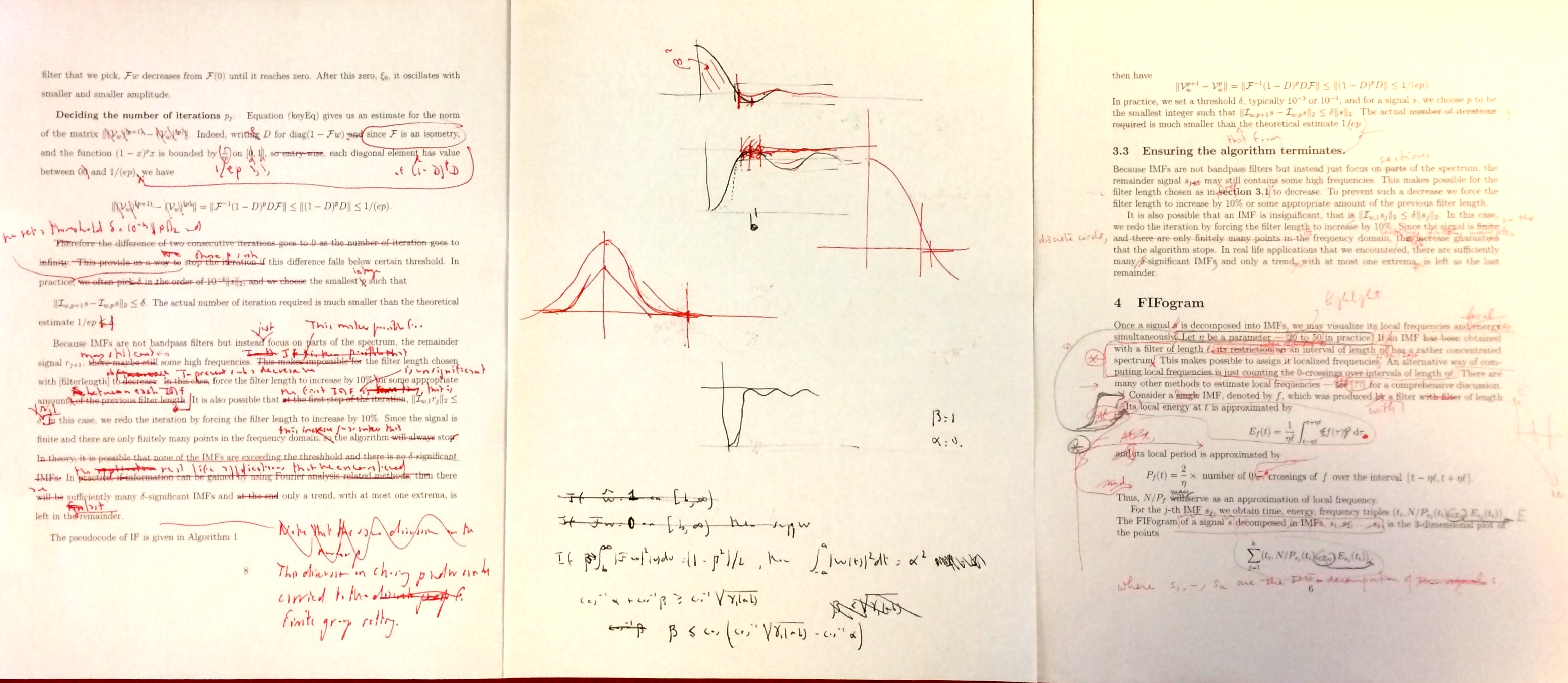 Philippe Barbe
Philippe Barbe

|
Should you hire a professional Mathematician?
|
No business I know of is in the business of proving theorems! But, a lot a businesses do benefit from hiring Mathematicians or I know a lot more who could.
Why?
Let’s pick up where we left off in Part 1 of our discussion of the this question which concluded with a look at the transferability of the skills of a professional Mathematician to the business world.
Straightforward transferable Skills
As discussed in Part 1, doing mathematics often manifests itself in the production of academic papers centered on proving theorems. The production of these works requires certain intellectual qualities that are amazingly transferable and useful for businesses.
In the current age of Data Science, AI, and numerical simulations, the rationale for hiring Mathematicians is most often based on their technical skills.
This article is not about these known skills. To the contrary, it is about the often-ignore non-technical abilities of Mathematicians… precision, understanding, intellectual honesty, conceptual thinking, collaboration, courage and perserverance, with more to come in the next article
Precision
Because mathematics is communicated mostly through writing, mathematicians write and read a fair amount and are accustomed to reading very precise texts, and making very precise statements.
Words matter a great deal to Mathematicians who pay great attention to the differences between the articles a and the, between all and some, between is and could be. They also care about punctuation and even fonts, because a comma and a semi-colon, a regular, a bold or an italic can make a big difference in the meaning that is communicated.
They share with lawyers the desire to be precise.
Consider a US Supreme Court argument where justices were trying to define a “concealed weapon” between an old cannon in the storage area of a museum and a loaded pistol tucked in a boot, what matters: the intent to use it? Ability to use it? Being loaded? Being manned? This is no different than a Mathematician trying to come up with a definition or trying to understand one, running through examples and counter-examples. Understandably, most Mathematicians have no problem reading legal texts.
Reading a mathematical texts is difficult, even for professional Mathematicians. A single line may need a few minutes to understand, reading with paper and pen at hand to spell out the details, to come up with examples and counter examples to ascertain a definition. Reading and understanding a 10-page paper may take days, even after having studying the subject for years!
As a consequence, Mathematicians in business tend to be very careful readers and writers.
When you hire a mathematician, you get an employee who can write, read, say and listen very precisely.
Understanding
By their nature, Mathematicians are inquisitive. “Why?” may be their favorite question. Not only do they have the ability to understand, they want to understand. In the same way that Justices search for legal principles, mathematicians search for reasons and understanding.
A theorem is first a conjecture. State it, and another Mathematician will ask you for a proof. Thus, Mathematicians are accustomed to being questioned and their words not taken for granted. Mathematicians are almost offended when they aren’t asked to prove an assertion. They don’t see it as a sign of distrust but rather if they don’t have to prove their claim it must be so simple that no proof is needed, known to be false, or not interesting… none of which are good things for Mathematicians!
Why do customers like our product? Why did this work? Why didn’t this work? Why should we focus on this project and not that one? Mathematicians are people who eagerly seek to get to the bottom of things and enjoy having their conclusions challenged.
To some in business such constant questioning may at times look like a lack of respect, lacking deference to the hierarchical authority.
It may seem subversive… and it is… in a good way, in the sense that true authority stems from reason, not position. If you cannot justify why someone should do something, why are you asking the task to be accomplished? A Mathematician’s questioning serves as a reality check of your goals. Of course, if you prefer yes-people, a Mathematician’s questioning may not be great for your ego, but often good for your bottom line.
A degree of subversiveness is a way to stay grounded. A convincing answer is motivational; an unconvincing one is a sign of a poorly designed project which probably needs to be revisited.
And it’s a mark of engagement: why would they question if they didn’t care?
Intellectual honesty
I have been around enough Mathematicians that the law of large numbers applies, meaning that even the most unlikely events are observed. You could say I’ve seen it all, including colleagues committing murder (thankfully unrelated to mathematics).
So far I have seen no exception to my observation that Mathematicians have a form of intellectual honesty.
This honesty has to do with the precision of language discussed above and the notion of absolute truth unique to the discipline of mathematics.
Because definitions are so precise, because the standard of truth is absolute, because assertions need to be proved, Mathematicians cannot pretend to have an answer when they do not, and they aren’t very willing to take an answer without a reason. All this makes them less believing in the “corporate BS” as they can look at an argument, and decide if it stands or not.
Mathematicians accept legitimate criticisms. They are often been proven wrong when discussing their own mathematical ideas. They do not take offense to being proven wrong. Instead they are grateful for pointing an error that prevents a mistake in a paper. Work with a co-author, and chances are that your first draft will come back unrecognizable with more marking than text.
Embarrassing mistakes do happen of course, but there are different types of mistakes. Trivial, easily fixed ones like typos; fixable ones, which require more work to fix; and unfixable ones, where the proof is irremediably wrong and simply won’t do. Most Mathematicians make all 3 mistakes at some point, but seldom in publications due to the criticism of their work beforehand by colleagues.
They are quite accustomed to, what in the business world, what would seem like totally out-of-line blistering criticism. They expect this level of criticism but seldom get it in business.
And, as you might suspect, this is what they may well give in a business setting to the shock of those asking for feedback who are accustomed to mild comments and general agreement.
The Mathematicians you hire mean no offense in their honest feedback. It’s not personal, although some may find it hard take.
Conceptual
While doing mathematics is about building an abstract construction, this construction is grounded in the world that we can perceive. For Mathematicians, a polynomial is something very tangible, as well as a useful abstraction.
This distinguishes Mathematicians from Computer Scientists, in particular their business version, Software Engineers, which may make communication difficult between the two.
Software Engineers have their own jargon, which sometimes cover concepts that are elementary for Mathematicians. “Normal forms” of databases is an important concept in software engineering whose significance Mathematicians cannot grasp because it is conceptually so elementary (redundancy avoidance, delineation of purpose) that it is hard to see what’s the big deal about it despite it’s very real importance in applications.
This difference of viewpoints creates interesting problems when hiring. Mathematicians tend to wonder what some technical questions are about, either because they do not know the terminology, or because they do not see what the conceptual problem is, missing that the problem lies in the implementation. But once explained, they can usually understand very quickly the implications.
The main value of conceptualizing is that concepts embody complex situations in simple ideas and simple words. It is therefore a step toward making simple things that are complex.
Collaborative
As discussed in Part 1, about 60% of mathematical papers have co-authors for two good reasons.
First, Mathematics is a very solitary endeavor because it is about proving theorems that emanate from your way of thinking about a problem. Ultimately, even if you are next to your collaborator, it is about how your mind creates the ideas that will allow you to prove something but others may stimulate your imagination and give you ideas about solutions.
Second, humans are gregarious. Working alone can be depressing. So they like to share their interests with others, particularly if they bring ideas
Mathematicians bring this collaborative attitude and experience to the business workplace.
Courage and perseverance
Most new mathematics starts with some vague idea of what a theorem could be, with some sort of informal conjecture. If the theorem is provable in a few minutes it is probably not a very interesting one.
Mathematicians like difficult problems. How difficult? It depends. Some Mathematicians are particularly capable, solving in a matter of days problems what takes others months.
Knowledge, practice, and luck, all play a role. But most Mathematicians like problems that take them weeks, months, even years to solve which is not at all unusual. It’s not that they are stuck for a year as they usually get partial results that they are able to publish (key to survival in academia) as they persist in the pursuit of a solution.
It requires great courage to face an unknown problem and persistence to single-mindedly focus on finding a solution over a long period of time. Mathematicians do not easily give up on what they care about.
In the business world that translates to taking risks, being tenacious and not giving up in face of adversity.
And that leads to innovative breakthroughs that create competitive advantage.
Conclusion
It is a wise business move to hire Mathematicians if your business needs people who pay attention to details, understand highly complex matter, make honest assessments, conceptualize to simplify complex situations, enjoy collaboration and do not give up easily.
But wait! There’s more! The next article will discuss much less obvious skills Mathematicians bring to the business table.